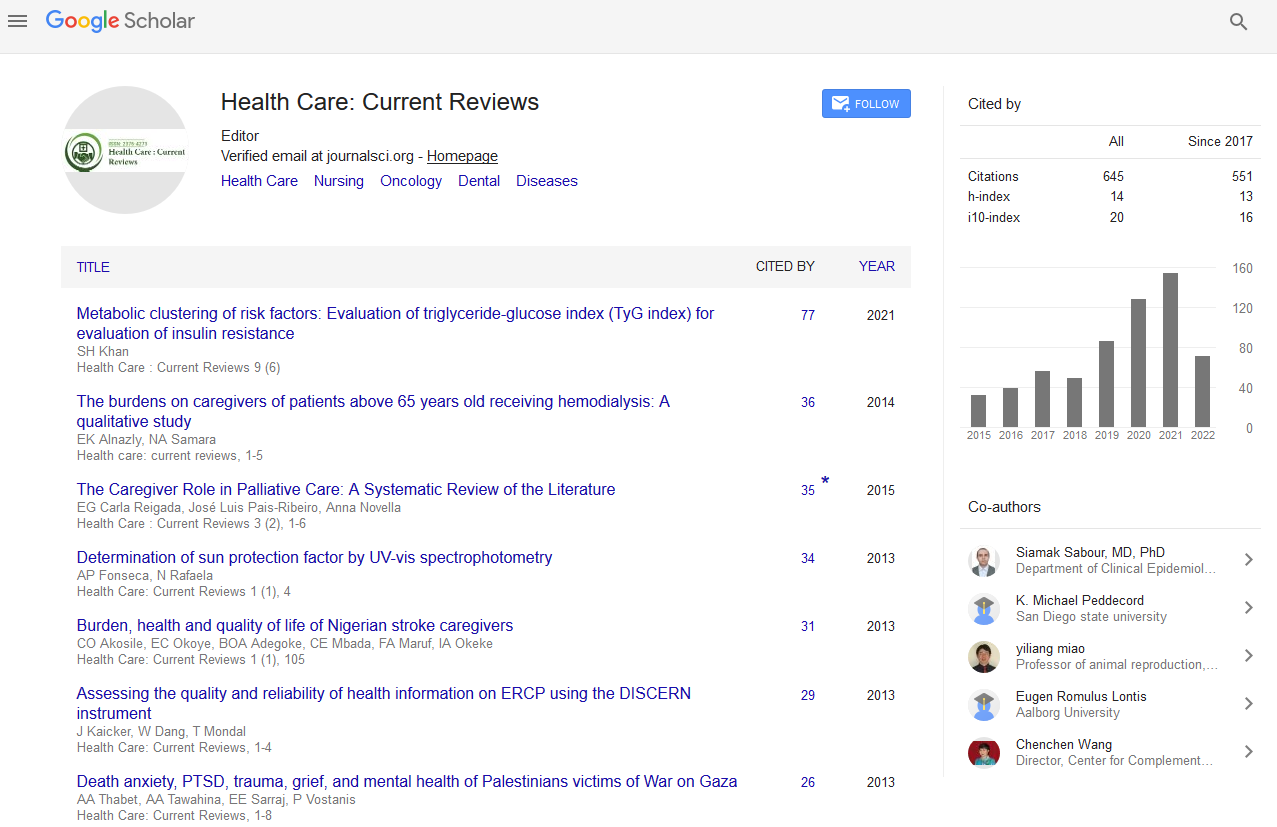PMC/PubMed Indexed Articles
Indexed In
- Open J Gate
- Academic Keys
- RefSeek
- Hamdard University
- EBSCO A-Z
- Publons
- Geneva Foundation for Medical Education and Research
- Google Scholar
Useful Links
Share This Page
Journal Flyer

Open Access Journals
- Agri and Aquaculture
- Biochemistry
- Bioinformatics & Systems Biology
- Business & Management
- Chemistry
- Clinical Sciences
- Engineering
- Food & Nutrition
- General Science
- Genetics & Molecular Biology
- Immunology & Microbiology
- Medical Sciences
- Neuroscience & Psychology
- Nursing & Health Care
- Pharmaceutical Sciences
PEDAGOGIC PROBLEMATIZATION ON THE TEACHING-LEARNING METHODS OF HEALTH: AN EXPERIENCE IN THE CRITIC-LIBERATOR THINKING IN MENTAL HEALTH
Joint Event on 2nd International Conference on Healthcare & Hospital Management and 6th International Conference on Medical & Nursing Education
November 6-7, 2017 | Vienna, Austria
Maria Clara S Maroja and Marta Maria C A Pernambuco
Federal University of Rio Grande do Norte, Brazil
Posters & Accepted Abstracts: Health Care Current Reviews
Abstract:
Statement of the problem: By rethinking the biologist attention, Brazil has been resuming the Paulo Freire��?s pedagogic practices on the health professionals formation. However, health education curriculums based on this pedagogy are still scarce and its assumptions need to be better investigated in practice. This study analyzed the contributions of Paulo Freire's Pedagogic Problematization in the development of working processes on health. Methodology & Theoretical Orientation: Evaluative, participative and qualitative research, case study type, conducted in 2017. The study took place at the Multiprofessional Residency Course on Mental Health, from the Federal University of Para�?ba, Brazil, whose plan course predicts the Freire's Pedagogic Problematization. Semistructured interviews with the tutors (7) were applied alongside a meeting of focus group with 20 residents. The Theoretical-methodological conceptions were based on Paulo Freire's pedagogical assumptions to investigate and develop the Teaching-Learning process. Findings: The guiding problematization of the Teaching-Learning process happens from the problem-situations and reporting of the residents experiences on Mental Health public services, where they act interdisciplinarity during 80% of the full academic course load. It was noticed that this feedback process action-reflection-action, allied to the interdisciplinarity, made it possible for the residents to see the bearers of mental illness not only under the various biological knowledges, but understand them in the complexity of their reality and empower them to overcome their own limits. It was also attributed to the pedagogic problematization, benefits to the functioning of health services and the community, such as improvements in physical structures, solidarity economy and popular participation on public mental health policies. Conclusion & Significance: The commitment of health education to the sociocultural, economic and political characteristics of each reality has been configured in a positive educational experience with significant advances at the working processes that extend to changes in the realities experienced by the students.
Biography :
Maria Clara S Maroja is a Doctorate degree student from the Federal University of Rio Grande do Norte. She graduated in Nutrition from the Federal University of Paraíba, expertise at Clinical Nutrition from the Gama Filho University, Rio de Janeiro, and Master's degree at Nutritional Sciences from the Federal University of Paraíba. She works at the Federal Institute of Education, Science and Technology, where she exerts publishing activities related to the Principia Journal and book publications. She is also a Reviewer of scientific journal articles. She was a Nutritionist at the City Hall of São Bentinho, Paraíba, and at the State Health Department, where she participated in the planning, implementation and evaluation of food and nutrition public policies. She has experience in health professionals training and in nutrition, with emphasis on nutrition and public health, maternal and child health (specially the promotion of breastfeeding) and evaluation of health public policies.


